negotiation styles
- 格式:dps
- 大小:608.50 KB
- 文档页数:11

NegotiationStyleQuiz for Negotiation StyleQuestion 1You want to sell your yacht and you know that you would be very fortunate to get as much as £225 000 for it. While you are considering placing the advertisement, a keen yachtsman approaches you and offers £250 000 in cash immediately for your boat. Do you:A. Accept his offer without further ado?B. Tell him to wait until the boat is advertised?C. Haggle?Question 2You are in the market for a yacht and have taken a fancy to the ‘Isabella’ which is advertised at £225 000. The most you can raise is £212 000 from selling your own boat and borrowing from the bank. You meet the owner in the boathouse and casually tell him of your (strong) interest. You mention that you could only raise £212 000. He agrees to sell you the ‘Isabella’ for that sum. Is this:A. An offer you cannot refuse?B. A lousy situation?C. An occasion to celebrate your bargain?Question 3A young talented actor wants to get into the ‘big time’ and she meets a television producer who is desirous of securing her services for an important part in a detective film. He tells her that she cannot get top rates until she is ‘known’ but if sh e does this one ‘cheap’ and gets famous, she will see ‘train loads of money’ coming her way for her future work. Shouldshe:A. Tell the producer to ‘offski’?B. Agree, as she has to start somewhere?C. Demand top rates if she is to do a top job?Question 4A customer, who buys simple forged metal components from you, tells you that they have decided to make them in-house when the current order is delivered. Do you:A. Offer to discuss your prices?B. Warn him that in-house manufacturing of these components would be more expensive when tooling, casting dies and quality controls are considered?C. Suggest that you discuss the problem with him?D. S ay ‘Fine’, wish them the best and to come back if they experience problems? Question 5The aluminium company's marketing manager is back on the phone, saying that your most recent purchase order cannot be fulfilled because it looks as if there will be a strike at the plant and all the stocks of aluminium ingots are being diverted for the manufacture and delivery of products for long term priority customers. Over your protests she tells you that first priority customers pay a premium price per ton over what you pay, despite the recent price increase you agreed with her. Do you:A. Ask what size of premium the priority customers are paying and offer to match it?B. Ask what size of premium the priority customers are paying and offer to beat it?C. Urgently take your business elsewhere?Question 6You have been buying a component for your room dividersystems, which you manufacture and install to order, from a large aluminium extruder for a number of years. Their new marketing manager rang you this morning with the news that they have decided to cease extruding your line because they cannot make a profit at current prices. Do you:A. Suggest that you re-negotiate the current contract price?B. Ask for details of their costings and profit requirements?C. Check for availability of capacity and prices from other extruders?D. Tell them that you are well aware of the negotiating ploy she is up to?Question 7You have been working only three weeks in a new job as a shipping agent in Baltimore, USA, and had planned to get married on Friday 18 August (which you did not disclose at the job interview). Your ‘intended’ spouse expect s a proper honeymoon vacation of at least a week in Bermuda. It's now 16 August and you ask your boss for leave for the wedding day and for the vacation. She is visibly not happy with your request and asks stiffly how long you were ‘thinking of being absent’. Do you reply:A. The wedding day only?B. Two weeks?C. Three days?Question 8You are a package tour operator negotiating with a Spanish hotel chain on the terms for next season's holiday bookings. The price they are asking per person per week in their hotels is £45 higher than your current offer. They offer to ‘split the difference’ 50–50. Do you:A. Suggest, say, 55–45 in your favour?B. Say you can't afford to split the difference?C. Agree to their offer?D. Agree, if it is 75–25 in your favour?Question 9Do you see negotiating as being about:A. A fair and equal transaction?B. Compromising?C. Making a joint decision in which you get some of what you want and they get some of what they want?Question 10You are engaged in extremely difficult negotiations with a Lebanese government department. After much haggling over finance for a rural road project, they make a small unilateral concession on their demand for irrevocable letters of credit. Do you:A. Note the concession but otherwise ignore it?B. Reciprocate with a concession of your own?。
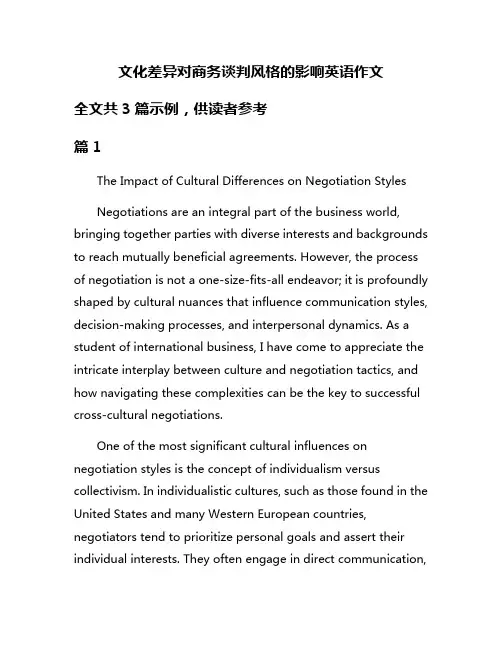
文化差异对商务谈判风格的影响英语作文全文共3篇示例,供读者参考篇1The Impact of Cultural Differences on Negotiation StylesNegotiations are an integral part of the business world, bringing together parties with diverse interests and backgrounds to reach mutually beneficial agreements. However, the process of negotiation is not a one-size-fits-all endeavor; it is profoundly shaped by cultural nuances that influence communication styles, decision-making processes, and interpersonal dynamics. As a student of international business, I have come to appreciate the intricate interplay between culture and negotiation tactics, and how navigating these complexities can be the key to successful cross-cultural negotiations.One of the most significant cultural influences on negotiation styles is the concept of individualism versus collectivism. In individualistic cultures, such as those found in the United States and many Western European countries, negotiators tend to prioritize personal goals and assert their individual interests. They often engage in direct communication,express disagreement openly, and strive for tangible, measurable outcomes that benefit themselves or their organization. Conversely, in collectivistic cultures prevalent in parts of Asia, Africa, and Latin America, negotiators place greater emphasis on group harmony, face-saving, and maintaining strong interpersonal relationships. They may adopt a more indirect communication style, avoid confrontation, and seek outcomes that benefit the collective rather than solely individual gains.This contrast in cultural values can lead to significant differences in negotiation approaches. For instance, in individualistic cultures, negotiations may be more transactional, with a focus on achieving specific terms and conditions. In contrast, in collectivistic cultures, the negotiation process itself is often viewed as an opportunity to build trust and establish long-term relationships, with the specific deal terms being secondary.Another critical cultural dimension that influences negotiation styles is the concept of power distance, which refers to the extent to which members of a society accept and expect unequal distributions of power. In high power distance cultures, such as those found in many Asian and Middle Eastern countries, hierarchical structures and authority figures are highly respected.Negotiators from these cultures may defer to those in positions of power and may be more comfortable with top-down decision-making processes. Conversely, in low power distance cultures, like those found in countries like Denmark, Sweden, and New Zealand, there is a greater emphasis on egalitarianism and participative decision-making. Negotiators from these cultures may be more comfortable challenging authority and may expect a more collaborative approach to negotiations.Time orientation is another cultural factor that can significantly impact negotiation styles. In cultures with a more future-oriented perspective, such as those found in many Western countries, negotiators may prioritize efficiency and strive to reach agreements quickly. They may also place greater emphasis on long-term planning and strategic considerations. In contrast, in cultures with a more present-oriented orpast-oriented perspective, such as those found in parts of Africa, the Middle East, and Latin America, negotiators may be more focused on building relationships and establishing trust in the present moment, with less emphasis on strict timelines orlong-term planning.Beyond these broad cultural dimensions, there are also numerous specific cultural norms and practices that caninfluence negotiation styles. For example, in some cultures, silence during negotiations is seen as a sign of respect and contemplation, while in others, it may be interpreted as a lack of interest or engagement. Similarly, the use of nonverbal cues, such as gestures, eye contact, and physical proximity, can carry vastly different meanings across cultures, potentially leading to misunderstandings or miscommunications during negotiations.Navigating these cultural complexities requires a deep understanding and appreciation of the diverse perspectives and communication styles at play. Effective cross-cultural negotiators must be adept at recognizing and adapting to these differences, while also remaining true to their own cultural values and norms. This may involve adjusting communication styles,decision-making processes, and even negotiation strategies to better align with the cultural expectations of their counterparts.For example, when negotiating with a counterpart from a collectivistic culture, it may be beneficial to invest time in building personal relationships and establishing trust before delving into substantive negotiations. Additionally, adopting a more indirect communication style and emphasizing the potential benefits to the collective group, rather than solely individual gains, can be an effective strategy.Conversely, when negotiating with a counterpart from an individualistic culture, a more direct and transactional approach may be more appropriate, with a greater focus on achieving specific, measurable outcomes that benefit the individual parties involved.Ultimately, successful cross-cultural negotiations require a delicate balance of cultural awareness, adaptability, and strategic decision-making. It is essential to approach negotiations with an open mind, a willingness to learn and adapt, and a genuine respect for the cultural perspectives of one's counterparts.As a student of international business, I have come to recognize the profound impact that cultural differences can have on negotiation styles and outcomes. By developing a deep understanding of these cultural nuances and cultivating the skills necessary to navigate them effectively, we can not only enhance our negotiation capabilities but also foster greater cross-cultural understanding and cooperation in the global business landscape.篇2The Impact of Cultural Differences on Business Negotiation StylesIn today's increasingly globalized business world, negotiating across cultures has become an integral part of conducting international transactions and fostering successful partnerships. Cultural disparities can significantly shape communication styles, decision-making processes, and strategies employed during negotiations. As a student aspiring to a career in the business realm, understanding the nuances of cross-cultural negotiation is paramount to navigating the intricate landscape of global commerce effectively.Culture, a multifaceted concept encompassing values, beliefs, attitudes, and behaviors, profoundly influences how individuals perceive and approach negotiations. One of the most notable cultural dimensions that impact negotiation styles is the distinction between individualistic and collectivistic societies. Individualistic cultures, such as those found in the United States and Western Europe, tend to prioritize personal goals, direct communication, and assertive bargaining tactics. Negotiators from these cultures often aim to achieve the best possible outcome for themselves, emphasizing competition and individual interests.In contrast, collectivistic cultures, prevalent in parts of Asia, Latin America, and Africa, place a greater emphasis on groupharmony, indirect communication, and a more cooperative approach to negotiations. Representatives from these societies typically strive to maintain relationships and avoid confrontation, valuing compromise and consensus-building over outright competition. Understanding these contrasting orientations is crucial for effective cross-cultural negotiations, as it can help bridge gaps in communication and facilitate mutual understanding.Another significant cultural dimension that shapes negotiation styles is the concept of power distance, which refers to the extent to which individuals accept and expect unequal power distribution within hierarchical structures. Cultures with high power distance, such as those found in many Asian and Latin American countries, tend to exhibit a more formal and hierarchical approach to negotiations. Decisions are often made by those in positions of authority, and negotiators from these cultures may be less inclined to challenge or contradict their superiors.Conversely, cultures with low power distance, like those found in Northern Europe and parts of North America, tend to adopt a more egalitarian and participative negotiation style. Negotiators from these cultures are more likely to voice theiropinions openly, challenge assumptions, and engage in frank discussions, regardless of hierarchical positions.Time orientation is another cultural factor that can significantly impact negotiation styles. Cultures with a more short-term orientation, such as those found in parts of the United States and Western Europe, tend to priorit篇3The Impact of Cultural Differences on Negotiation StylesNegotiation is a crucial aspect of any business transaction, and the ability to negotiate effectively can often make or break a deal. However, negotiation styles can vary significantly across cultures, and understanding these differences is essential for successful cross-cultural negotiations. In this essay, we will explore the impact of cultural differences on negotiation styles and how these differences can be navigated to achieve mutually beneficial outcomes.One of the most significant cultural differences in negotiation styles is the emphasis placed on individualism versus collectivism. In individualistic cultures, such as those found in the United States and Western Europe, negotiators tend to prioritize individual interests and goals. They are often more direct in theircommunication and more willing to engage in confrontational tactics. In contrast, negotiators from collectivistic cultures, such as those found in many Asian and Latin American countries, tend to prioritize group interests and harmony. They may be more indirect in their communication and place a greater emphasis on building relationships and saving face.Another key cultural difference in negotiation styles is the attitude towards time and deadlines. In some cultures, such as those found in Northern Europe and the United States, time is viewed as a valuable commodity, and punctuality and adherence to deadlines are highly valued. Negotiators from these cultures may become impatient if negotiations drag on for too long or if deadlines are not met. In contrast, negotiators from cultures with a more relaxed attitude towards time, such as those found in Latin America and parts of Asia, may view deadlines as more flexible and may be more willing to take their time in negotiations.The importance of personal relationships in negotiations is another area where cultural differences can play a significant role. In many collectivistic cultures, such as those found in Asia and Latin America, personal relationships are highly valued, and building trust and rapport is essential for successful negotiations.Negotiators from these cultures may spend a significant amount of time getting to know their counterparts and building personal connections before delving into the substantive issues. In contrast, negotiators from individualistic cultures may place less emphasis on personal relationships and may be more focused on the specific terms and conditions of the deal.Cultural differences can also impact the communication styles used in negotiations. In some cultures, such as those found in Northern Europe and the United States, direct and explicit communication is preferred, with negotiators stating their positions and interests clearly and directly. In other cultures, such as those found in Asia and parts of the Middle East, indirect and implicit communication is more common, with negotiators using subtle cues and nonverbal communication to convey their messages.Furthermore, cultural differences can influence the decision-making processes used in negotiations. In some cultures, such as those found in Western Europe and North America, decision-making tends to be more centralized, with a small group of individuals or a single individual having the authority to make decisions. In other cultures, such as those found in Asia and parts of Africa, decision-making may be moredecentralized, with input and consensus sought from a larger group of stakeholders.To navigate these cultural differences successfully, it is essential for negotiators to develop cultural intelligence and sensitivity. This involves not only understanding the cultural norms and practices of their counterparts but also being able to adapt their own behavior and communication styles to bridge the cultural gaps.One effective strategy for navigating cultural differences in negotiations is to conduct thor。

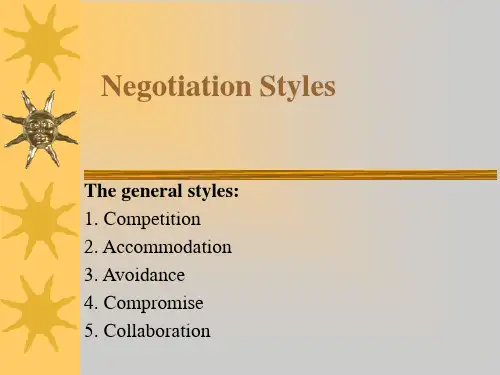

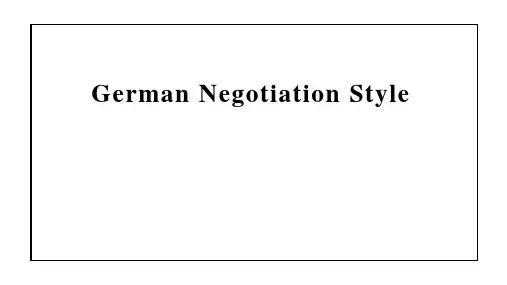
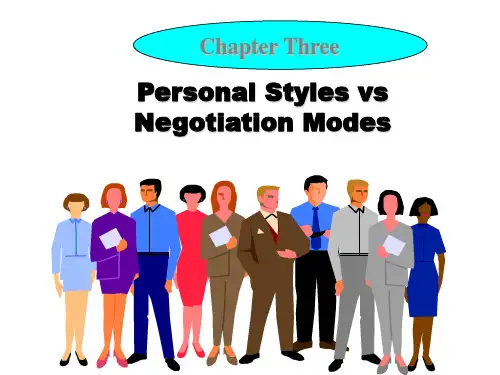

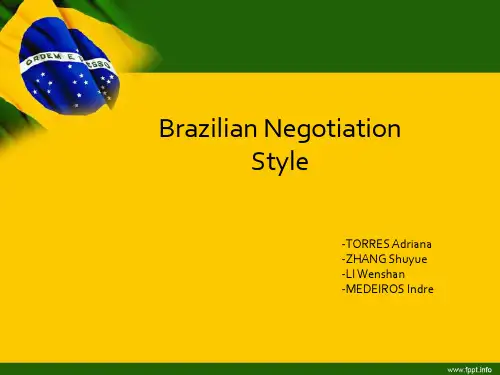
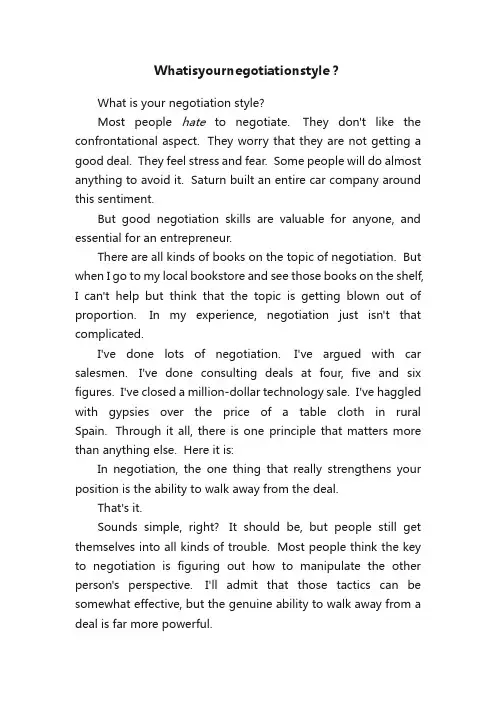
Whatisyournegotiationstyle?What is your negotiation style?Most people hate to negotiate. They don't like the confrontational aspect. They worry that they are not getting a good deal. They feel stress and fear. Some people will do almost anything to avoid it. Saturn built an entire car company around this sentiment.But good negotiation skills are valuable for anyone, and essential for an entrepreneur.There are all kinds of books on the topic of negotiation. But when I go to my local bookstore and see those books on the shelf, I can't help but think that the topic is getting blown out of proportion. In my experience, negotiation just isn't that complicated.I've done lots of negotiation. I've argued with car salesmen. I've done consulting deals at four, five and six figures. I've closed a million-dollar technology sale. I've haggled with gypsies over the price of a table cloth in rural Spain. Through it all, there is one principle that matters more than anything else. Here it is:In negotiation, the one thing that really strengthens your position is the ability to walk away from the deal.That's it.Sounds simple, right? It should be, but people still get themselves into all kinds of trouble. Most people think the key to negotiation is figuring out how to manipulate the other person's perspective. I'll admit that those tactics can be somewhat effective, but the genuine ability to walk away from a deal is far more powerful.Negotiating from a position of real need is a bad, bad situation. You are almost certainly going to lose. The other party will push until they find your threshold of pain. Examples here include:•Bartering about salary when you are unemployed.•Raising venture capital when your company is almost out of cash.•Buying a car when you really have to buy one.I realize that things happen which are beyond our control. Some of these situations are unfortunate and unavoidable. But in any negotiation, your best investment is to figure out a way to get by if the deal falls through.Practice this principle the next time you buy a car:1.Start shopping for a car before you really need to.2.Before starting the negotiation for any specific vehicle, clearly understand your fallback plan. What will you do if you don't get this car? Buy something else? Take the bus? Ride your bike?3.Don't let yourself get emotionally attached to the car until it's yours.4.Figure out in advance what you want to pay. If you can't get the deal you want, walk out. You can always come back later if you want.My current vehicle is a Chevy Avalanche. When I was shopping for it, I went to my local Chevy dealer, picked out a truck, figured out what I wanted to pay, and made an offer.The sales guy smiled at me and said, "That's absurd."I calmly replied, "I am quite certain you will make a profit if you sell me this truck at the price I have offered. It won't be your most profitable deal this month, but you'll make money, andyou'll get a vehicle off your lot. But either way, I am going to buy a Chevy Avalanche. Somebody is going to accept this offer. The only question is whether it's going to be you or somebody else."In the end, the sales guy started playing games and I walked out. Two days later I made the same offer to his competitor in a nearby town and drove home in my new truck.Whether you're buying or selling, whether it's a car or a table cloth or a company, the principle always works the same way. The way to get burned is to spend all your time daydreaming about how wonderful things will be after the deal is done. The way to win is to carefully figure out how tolerable things will be after the deal falls through. In almost every case, the winner of a negotiation is the party who is best prepared for the possibility of the deal not happening at all.。
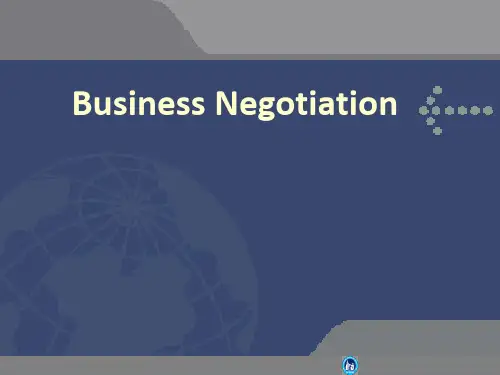
NegotiationBusiness NegotiationⅠIntroductionAs we all know, in business and trade, negotiation is one of the most important parts. With a appropriate negotiation, we can get a maximum interest. So what is a “negotiation”? Negotiating is part of every day life. We have a notion that negotiation is very far from our daily life, however, you negotiate more than you realize. As students, we have to negotiate when we want others to accept our perspective. In business and administrative position, you do so when you are dependent upon others for getting your ideas accepted, your goals accomplished or your problems solved. You also negotiate on how tasks, rights and responsibilities, resources and risks, and monetary gains and losses should be assigned or divided up.Negotiation is a cooperative undertaking, in which you and the opposing party attempt constructively to find solutions that satisfy both your needs. Successful cooperation results in solutions that are more cost-effective and involve less risk. The needs of others and the needs of the environment are more likely to be given consideration.With the entry of China into the World Trade Organization (WTO)and the holding of the 2008 Beijing Olympic Games, Chinese enterprises are entering into the international market, Chinese economy is integrated into the world’s economy more widely. So learning how to negotiate is of great importance.In the paper, I will briefly introduce negotiation and tips on how to negotiate, also some parts of negotiation.ⅡNegotiation StylesGenerally speaking, there are 8 types of negotiation styles. Those 8 styles are: Competitive style, accommodative style, avoiding style, compromising style, collaborative style, revengeful style, self-injurious style and revengeful and self injurious style. Among those 8 styles, it is generally accepted that the collaborative style will get the maximum interest. T o be an excellent negotiator, one should know how to choose different style when in different situation. That’s the relevant point of succeeding in negotiating.Here, we should know that We not only negotiate to solve problems, but also how to divide up responsibilities and work, as well as the distribution of costs, risks, profits and gains. So accomplishing this successfully places special demands on you as a negotiator. You need to be businesslike. This requires you finding a happy balance between two extreme behaviors, that of being na?ve and that of being greedy.A na?ve negotiator gives away too many advantages and too much potential profits. He accepts too much of the work and responsibility, and too many of the risks. Thus a na?ve negotiator is expensive for the organization. He is easily taken advantage of. Even the parties he negotiates have little trust in him.A greedy negotiator wants to get everything without being willing to give. He is unable to accept the idea of the other party gaining anything. He wants to threat the other party and defeat it. A greedy negotiator is also expensive for the organization.No one wants to deal with him. People avoid him if they can. Those he has victimized are likely to seek revenge. A greedy negotiat or, just like the na’i’ve one, fails to gain trust and support.ⅢTips on negotiation1. Do Research into Concession ValueMake a list of “items of value”and use them when the other side asks for Concessions. Also make a list of things you want in return. Know your bottom line. Never give something away if it doesn’t make sen se for your business.2. Use Time to Add UncertaintyGreat dealmakers have a knack for making the right concession at just the right time. Never respond immediately to a request for a concession. Instead, use time to add uncertainty, thereby adding value to the concession when you make it.3. Not Make Huge ConcessionsDon’t make huge concessions, especially on the first go-round. Making a large Initial concession undermines your credibility and sends the message that you still have plenty of room to come down.4. Decreasing the Amount of Concessions GraduallyMake concessions in decreasing increments. This establishes more credibility for your opening position and signals that you have little room left in which to move.5. Beware of “Insignificant”concessi onsGreat negotiations can take you to the cleaners by constantly asking for small concessions. Always wait until you have the whole story before agreeing to a small concession.6. Balance Must Be AchievedAs we noted, every negotiation is a trade. You want to gain something; others want something from you. Concessions often become critical to closing a deal. But successful negotiators understand that a balance must be achieved. Every concession you make must be matched by a similar concession from the other side. Never make a concession without asking for one inreturn. If you give without getting anything back, you reinforce the behavior of asking for the concession.ⅣTransportationThere are so many important parts of business negotiation. Insurance, packing and shipment, transportation and so on. Here I mainly talk about transportation.There are many means of transportation in international trade. Trains, trucks, airplanes, ship, or multi-model transport can transport goods to various designated places. Each has its advantages and disadvantages. Generally speaking, the choice of the transportation means depends on time and cost and distance as well. Ocean freightis still the most extensively adopted form of transit in international trade, because it is commonly employed as a cheap mode of transport for delivering large quantities of goods over long distance, by both China and many other countries. In spite of its disadvantages of being slow and affected by weather conditions sometimes like an ocean storms, about two thirds of the goods are transported by ocean freight, including the growing containerized transport service in recent years, in international trade.Partial shipment is necessary to make shipment in several lots by several carriers sailing on different dates, in case of an export covering a large amount of goods. This is done because of the limitation of shipping space available, poor unloading facilities at the port of destination, dull market season, or possible delay in the process of manufacturing the goods. And this is allowable, only if the clause “Partial shipment to be allowed” is agreed upon in the contract.Transshipment in marine transport is the movement ofgoods in transit from one carrier to another at the ports of transshipment before the goods reach the port of destination. Transshipment is necessary when ships going direct to the port of destination are not available, or the port of destination doesn’t lie along the sailing route of the liner, or the amount of cargo for a certain port of destination is so small that no ships would like to call at that port. Transshipment is allowed when the contract has a clause like “ transshipment to be allowed”.ⅤConclusionNegotiation is a cooperative undertaking, in which you and the opposing party attempt constructively to find solutions that satisfy both your needs. Power, ego and saving face are the dynamics of negotiation, while trust, emotions and justice are the key elements of negotiation.。
Negotiating Styles, Part 1MAJOR PERSONAL STYLESINTERNATIONAL COMMERCIAL negotiation is a zero-sum game that pits every gain against a loss. And when successfully completed, losers believethey’ve won and winners give every indication of bearing up under defeat.Language and fortitude are used to create a belief that everyone will walkaway from the table with “enough,” even if one side’s portion (hopefullythe opponents Side) is far less than forecasted.Each negotiator and every negotiating team must choose a style that will best serve their goal. The same style will not work in every situation,nor will every situation permit every style. Negotiators and teams must beflexible, able to change style as easily as they change locale. The sameresearch skills that have been focused outward should now be turnedinward, as honest and thorough self-assessment will permit the mostappropriate choice of both personal and team styles.Choosing a Style That FitsBelow is a listing of twenty-three different personal negotiating styles.Rarely does a person use one style to the exclusion of all others, andthere’s a great deal of crossover. It’s rare (if not impossible) for someoneto adopt a style that runs contrary to their personality. Also, these styles areoften countermeasures to each other. (A full listing of countermeasures aresuggested in Chapter 15.)Negotiators strive to he believed, and they must believe in their own discourse if they’re to be successful. Even the most talented actors havelimits of range. (Robert De Niro can convincingly portray a maniacalgangster, but he probably won’t succeed as Oedipus Rex.) Potentialnegotiators must research their own talents and virtues to determine whichstyle or combination of styles best fits their personality.Chief negotiators must make similar decisions when assembling a team. One can’t have a soccer team comprised entirely of all-star goalies.Diversity is required. Assembly of the right combination of talents, styles,and flexibility will result in a team that can handle virtually any negotiatingsession. Team leaders must also be on guard against members whoendeavor to utilize styles that are incompatible with team goals.AGGRESSIVEMany people see themselves as aggressive hut few actually fill the bill.Aggressive negotiators run roughshod over opponents with little regard for their counterparts’ positions. They take no prisoners and grant no quarter, and the word “concession”isn’t found in their lexicon. Aggressive negotiating does have its place if used in small doses, while constant belligerence will rarely result in a penned contract. Skilled negotiators will assume an aggressive posture only when supposedly non-negotiable points are being discussed.WARNING: As is true in daily life, aggression brings its ownadditional pricetag. Aggressors throughout history have beenoutflanked in their mad rush for success by more patientopponents. Aggression is best used as a temporary negotiatingtactic, not as an overall strategy.COMPLIANTCompliant negotiators are the archenemies of counterpart aggressors.Their style demands that many points are readily conceded early in negotiations in an effort to draw the aggressor farther into the process.Major points are purposely kept off of the agenda until late in the negotiations when the aggressor believes they’ll continue to receive concessions. In reality, the compliant side has “run the clock out” and will start demanding “payback” for earlier concessions. The aggressor has been enveloped and placed in the position of possibly scuttling very expensive negotiations and returning home empty-handed. Compliance can be a very effective style hut only when used by hosts. It requires strict control of the agenda and the ability to recognize when counterparts have been sufficiently lu1led.NOTE: Compliance is particularly successful when a great deal ofPR surrounds the proceedings and visitors have been sending outsignals of imminent success.PASSIVEPassive negotiators aren’t always what they seem. Often utilized by developing economies with little contract law, passive negotiating convinces the opposition to put all of their cards on the table in the belief that everything is mutually acceptable. The passive side presents nothing and simply nods -- and counterparts believe they’re in agreement. But the nod denotes understanding only. Once all has been revealed, the previously passive negotiators start “cherry picking” the points they find palatable and actively (sometimes aggressively) reworking those they don’t. Passivenegotiators rarely present their own program; instead, they nitpick the opposition’s program in an effort to keep them on the defensive.Passivity is also used by novice negotiators to learn about the cultural negotiating styles of economies with whom they’re unfamiliar. Seeking only an education and not a contract, they pursue their research by letting the opposition reveal data and techniques to be used against “bigger fish”in future negotiations. Many medium-sized technology companies were lured to developing Asia in the late 1980s and early 1990s with promises of market penetration. But unbeknownst to them, they were there to provide practice sessions for negotiators soon to lock horns with Motorola, Seimens, and NEC. Passive “research”negotiators also travel outside of their borders to see how potential counterparts behave on their own turf.Either way, they use up time in fruitless negotiations. This style and strategy is considered deceptive by some cultures and “just business”by others.One hallmark of both types of passive negotiators is that they don’t seek out any input during the agenda-setting process. Research teams can also be recognized by their requests for information unrelated to the negotiations at hand.WARNING: It’s very costly to mistake passivity for agreement. IMPASSIVEThe impassive negotiator is purposely unreadable. Inscrutability isn’t the exclusive domain of the Chinese; it’s been successfully used by skilled negotiators around the world for centuries. By creating an image of being indifferent to either winning or losing on any particular point, impassive negotiators cause their counterparts to believe that some secret is being withheld. The impassive buyer also causes the opposition to go to extreme lengths to please. Because they can’t see what pleases or displeases, sellers often “shoot the works” in an effort to get a reaction from the sphinx across the table. Skilled, impassive buyers can get a great deal more with silence than they can with vocal manipulations. In this case, money doesn’t talk -- it stares.Impassive sellers attack from the opposite direction. Selling and indifference, though seemingly antithetical, aren’t always so. Sellers who have many suitors can name their own price as well as pick and choose among the suitors. It’s basic supply and demand. A seller who is impassive creates in the buyer’s mind a sense of insecurity that the sale may not be “permitted” or that a competitor will get it instead. This attitude of “if you don’t meet my price someone else will” puts the buyer in the unenviableposition of begging to spend money. Impassivity by sellers is a highly effective style for both trade and investment, but it requires counterparts who are short on research. Buyers truly must believe that their counterparts are “the only game in town”for it to work. First offers, no matter how lucrative, must be met with a dispassionate eye. Practitioners, whether buying or selling, must be masters of the poker face.INTIMIDATINGIntimidation is the instillment of fear in opponents and fear is a forceful motivator. Unfortunately, it’s a short jump from fear to loathing, and loathing is no basis for a relationship. Therefore, fear should be applied judiciously, so that the recipient feels its effect but is unaware of the process. Fear in international business is usually couched in terms of being excluded from a market or a particular money-making endeavor.It is not easy to be intimidating, and for commerce it’s strictly a matter of attitude rather than physical presence. It shouldn’t be confused with aggressive behavior, although in some circumstances it can take that guise. Above all else, intimidation at the negotiation table requires the will to back up words with action. Also, intimidation requires the cooperation of counterparts. (They must choose to be intimidated if this style is to be productive.) Skilled negotiators have high fear thresholds but thresholds nonetheless. Learning what intimidates counterparts and when will determine if this style of negotiating will ultimately work. The following statements indicate that intimidation is at play:“Of course you realize that only a limited number of contracts will be issued this year.”“We understand how important this deal must be for your company.”“Yours is the third company we have spoken to this month regarding this matter.”“We hope you’re more successful than the other (insert your nationality or industry) companies we’re met with.”“Are you aware of (insert your competitor’s name) interest in this project?”“Our government takes special interest in ventures that involve foreign companies.”“We understand that your company has other interests in our country.”“If agreement isn’t reached by the end of today’s session, we must understandably consider other offers.”“We would like our legal counsel to review your proposition.”TECHNICALTechnical negotiation centers on the data of the product or service under discussion and it counts on the opposition being worn down by the onslaught of technical details. Many negotiating teams purposely include a member who is highly knowledgeable about technical processes. Besides being able to answer the occasional question, they can also be used to thwart the opposition’s attempts to downplay (overplay) the monetary value of the technology.This style comes into play in joint ventures where partnership percentages are determined by the agreed-upon value of what each side “bring to the table”. Manufacturing economies tend to value physical property (e.g., factories, hardware) over intellectual property (e.g., manufacturing processes, software) while technological economies have reverse value. The technical negotiating style strives to foster a belief in the opposition that their lack of knowledge precludes them from being able to determine market value.WARNING: The technical style requires that the opposition bemade to see the limits of their knowledge only in a particular area.Making the other side feel stupid will be of little value in the longrun. Also, translators must be well-versed in the data if thistechnique is to be effective.FINANCIALOddly enough, many business negotiations (and negotiators) strive to downplay the role of money making. Many cultures wish to avoid appearing greedy, while others merely to keep the opposition focused on other issues until it is time to deliver the unfortunate fiscal news. The financial style of negotiating specifically plays upon the discomfort that counterparts feel when discussing this all-important issue. When used as part of an overall buying/investment strategy, practitioners of this technique talk in terms of money at every juncture of the agenda. All points of discussion must be made compatible with the bottom-line. If a subject can’t be shown to contribute to profit, counterparts are asked why they’re wasting time talking about it.NOTE: Americans are famous for their financial focus duringnegotiations and are sometimes considered boorish for theirefforts. Boorish but rich.As a tactical maneuver, financial negotiators can browbeat the opposition much in the same way that technical negotiators can. Suddenly switching the focus to finance can put bogged down discussions back on track as counterparts strive to back away from issues in which they are not conversant. Besides having the financial knowledge necessary to make this style work, practitioners must also be dispassionate debaters. Remaining unemotional will permit the negotiator to avoid accusations of greed and allow the pursuit of topics on a “just business” basis.LEGALISTICContrary to popular belief, lawyers are notoriously bad negotiators -- the logic being that if they were good at it, judges would be unnecessary.But this isn’t to say that a legalistic negotiating style has no place at the tab1e. A1l business is constrained by law to some degree, and negotiators must be concerned with its effect on the business relationship they’re attempting to mold as well as the direct effect upon ownership, taxes, and staffing.In most of the developed West, legal considerations (and lawyer) are expected at the negotiating table. Here the legalistic style is used to remind all participants of their responsibilities and potential benefits under local and international law. Time consuming and petty it may seem, but a team or single negotiator with only minimal legal knowledge will be at a decided disadvantage. When one side adopts this posture, counterparts must be quick to respond in kind. )The developing world is a different matter. Many Asian business cultures prefer to carry on business both above and below the table. The same is true of many South American, Middle Eastern, Eastern European, and African communities. Agreement with the process is not as important as understanding and manipulating your counterpart’s reaction to legal wrangling.Foreign buyers working in such markets will find that adapting a legalistic approach to negotiations at key intervals will result in the granting of major concessions. However, using it as an overall strategy will most likely derail the process completely, as sellers will not be able to envision any profits if kept within the narrow constraints of their domestic legal system. Foreign sellers who attempt to secure legal protection forevery negotiated point in these cultures will find the going difficult, if not impossible.When you are acting as host to sellers from cultures that prefer to work outside of a tight legal structure, the use of the legalistic style will keep the negotiations firmly in your hand. Counterpoints will be disconcerted and obligated throughout discussions. When you are hosting a group of buyers, negotiators should use legalistic tactics only to that degree that will protect payment or investment transfer.NOTE: Regardless of the legal wrangling at the table, contractexecution may not always be ideal if the respective governmentsdon’t have similar commercial codes. Additionally, using orresponding to a legalistic approach will require added researchtime -- and therefore cost. Foreign negotiators should always havea basic knowledge of the host’s legal system and applicableinternational laws.SECRETIVEMany negotiations are conducted wholly or partly in secret. This may be the result of personal privacy issues involving participants, high level diplomatic sensitivity, legal ramifications, or a desire to keep the press at bay. Demanding that the discussions remain secret is also a strategy that can influence the outcome. Secrecy eliminates outside pressure and concentrates the participants on the issues. And it can be used to keep counterparts from seeking outside assistance or information once negotiations begin.If you or your company is the subject of such request, regard it with care. Secrecy isn’t always easy or inexpensive to maintain. Make inquiries about the reason for such furtiveness and make sure that it will not restrict your own negotiating style or content. If the conditions for secrecy are accepted, negotiators must prepare accordingly.NOTE: Secrecy creates a very restrictive atmosphere and it shouldbe requested or acquiesced to only under special circumstances.Single negotiators from a team are often contacted by their counterpart and solicited for special “side meetings”that are to be kept hush--hush. Team members should be instructed to agree to nothing until they’ve had time to consider the fallout. Individual negotiators must pledge to inform CNs of any attempts by counterparts to meet with them. Team leaders must be prepared to deal with this prospect and be aware that, oftentimes, the weakest link is singled out by the opposition. If your teaminitiates such secret side meetings, it should realize that counterparts may be offended and view the remaining sessions as suspect.DECEPTIVEOnly the most naive of negotiators will deny the value of deception.Use varies by degree from one team to the next, but it’s omnipresent.Disputes over its use arise only between groups that commit lies of omission and those that proffer outright deceptive information or promises.Misleading counterparts and shielding intent are tools that all successful negotiators use. Adapting deception as the main strategy is only productive if the intent of the negotiations is short-term and doesn’t focus on contract signing (i.e., gathering of research). Successful long-term relationships can never be based on a wholly deceptive strategy.Deception as a style is most effective when used in small doses.Because all negotiators are guilty of it, they’re also willing to forgive a bit of deception by counterparts. They may even be planning on it. Deception will be discussed in more detail in Chapter 15 on tactics.NOTE: Negotiators who can’t deceive effectively are destined todefeat. Letting opponents know your every move and the depth ofyour strategy is no more effective at the negotiating table than it ison a battlefield. Deception, like truth, is but a tool.EXPLOITIVEAll opponents have weaknesses that can be exploited. Negotiators must determine for themselves which weaknesses to exploit and when. The zero-sum nature of the process demands a certain amount of exploitation.When best practiced, the exploitive style involves a careful study of counterparts before and during discussions. As the weaknesses become apparent, the practitioner makes rational (never emotional) decisions to capitalize on the flaw immediately, to let it pass, or to reserve exploitation until later in the negotiations. Therefore, (the assessment of a counterpart’s failings should be a large part of the negotiation planning process.Exploitive styles must be conducted with great subtlety as very few counterparts are so desperate as to welcome or tolerate outright exploitation. Weak undeveloped economics are especially paranoid about any form of what they deem exploitive. (Unfortunately in these same economies, the term is often used to describe any profit made by a foreign company. Exploitive styles will generally involve the use of deceptive tactics, and therefore they rarely survive long-term scrutiny.The most common form of this style calls for taking advantage of a counterpart’s ignorance of the true value of their resources in the global market or of their inability to access that marketplace directly (e.g., Southeast Asian labor).NOTE Like deception, exploitation is used to some degree by allnegotiators. Keeping an eye on the longevity of the deal willenable negotiators to determine proper dosages and timing. STUBBORNThere may be no such thing as a truly non-negotiable topic, but inflexible behavior abounds at some negotiating sessions. Choosing stubbornness as an overall style is risky as it may force the opposition to become equally stubborn on points it feels strongly about. Historically, immovable objects are easy to out maneuver and real long-term stubbornness is the Maginot Line of negotiating styles.Some negotiators use stubbornness as a way to distract counterparts from true motives. Relenting on a supposedly non-negotiable point will bring concessions -- important ones -- as a form of payback. Like many other styles it should be used only on occasion, as constant use results in predictability.AMBIVALENTAmbivalence is something that negotiators never consciously choose as a style, but it’s often there as a character default. Professional negotiators and teams never suffer from it, but may find themselves sitting across the table from counterparts rife with its effects. Ambivalent teams and individuals that are unable to make or hold to decisions can flummox discussions as easily as stubbornness can. By being forced to review subject matter again and again without reaching a conclusion, the opposition may become frustrated to the point of termination.Many teams that are new to the international market or those under local governmental scrutiny suffer from ambivalence. Their leadership works under the premise that no decision is better than a bad decision. (No decision is a decision.) Even when the proposal works in their favor, they still believe it is too good to be true. Most ambivalence stems from a lack of research concerning the particulars of the deal at hand.WARNING: As will be seen in Chapter 11 on team styles, thetime consuming internal discussions that are associated withambivalence should not be confused with consensus building.PRAGMA TICPragmatism can be very formidable, both as a strategy and a tactic.Taking to the high ground of efficiency will place counterparts on the defensive and force them to review their proposals purely from a practical standpoint. However, it does require that negotiators have already done the same with their own positions. Recommending practicality when your own positions are idealistic at best will not lend credibility to your maneuver.As a strategic style, pragmatism demands extensive research and a complete, well-thought-out plan that can be laid out in some detail early in the negotiations rather than incrementally. The plan should provide potential courses of action for counterparts as we1l. If done properly, the opposition will gladly choose from options provided by our plan.Pragmatic strategies require that you think of everything. The numbers are laid out for all to scrutinize. Pre-negotiation planning sessions involve a great deal of devil’s advocate type role playing. Be aware that some counterparts may resent your planning of both sides of the negotiation, even when the proposal plainly overshadows their own concepts and provides them with a substantial piece of the commercial pie. Efficiency isn’t loved the world over and it’s often seen as a relative term with cultural overtones.Pragmatism is most often used as a tactical style to get negotiations back on track. Statements like “let’s cur to the chase …”or “ti me to cut through the haze …” are dropped into the discussion as an indicator that quibbling should cease and real issues get resolved. If diplomatically phrased, no one side will be held culpable. Pointing fingers will merely take up more time and detract from the argument for practicality. All discussions run the risk of tangential debate; a call for pragmatism will refocus everyone on the agenda. However, practitioners should take care that they don’t dismiss their counterparts’proposals or arguments out of hand. Good listening skills and an understanding of the milieu in which counterparts must function will greatly assist in establishing when a pragmatic style is most appropriate.NOTE: Even pragmatists must have fallback positions, in casetheir original proposal isn’t accepted.BRINKMANSHIPBrinkmanship as a negotiating style is purely tactical in nature and involves the issuance of ultimatums on specific points. The threat of the ultimatum (or “the brink’) is that discussions will be called off unless an issue is resolved immediately or in a specified manner. It’s more bullyingthan negotiating and can only be used effectively by a powerful opponent, most likely in a host-buying position.This style can’t be used very often, although many negotiators have effectively used it early in discussions and then held it as an implied threat throughout the remaining sessions. Counterparts that are evenly matched will rarely deploy it, and novices are warned against even considering its use, no matter how tempting. Negotiation by ultimatum, even when practiced by professionals, always -- repeat, always -- leads to resentment.Its use in simple trades, and short-term deals will make any continued relationship difficult.ARROGANTSimilar to ambivalence, arrogance is an unconscious choice as a negotiating style. It’s also what inexperienced negotiators often call their well-organized, successful counterparts. Wise negotiators must be on guard against both conditions.Regardless of your opponents’position or attitude, behaving in an arrogant manner will only add an emotional edge to your counterparts’ demands. Remember that negotiating is about bending the opposition to your will, not driving them away. There are two main causes of arrogant behavior. One is a feeling of inferiority on your part. The other is not understanding that your counterpart is being made to feel inferior.Reactions and the accompanying behavior are unconscious but not uncontrollable.In the first case, the practitioner isn’t comfortable with his own status, facility, appearance, proposal, or company. The response is to assume a supercilious pose to hide a lack of confidence. If the opposing side is skilled, they’ll see through this amateurish guise immediately. If they’re not skilled, what was the point of feeling inferior?In the second case, where negotiators’ behavior gives the appearance of arrogance, they have most likely been acting in a manner that disregards the counterparts’viewpoint. Understanding the opposition is a necessary part of the negotiating process. If they feel inferior (and maybe rightfully so), it’s in a negotiator’s best interest to dispel that notion; keeping the discussions among “equals”makes the granting and receiving of concessions easier. “Inferiors” begrudge every concession they must grant and see every one received as a form of justice. Domineering agenda planning, the throwing of lavish parties that can’t be reciprocated, arriving late for meetings, constant cultural comparisons, and implications that you’re here to “help” the opposition will only aggravate the situation.NOTE: Avoid the arrogant style by being vigilant of your ownbehavior and the opposition’s reactions.SELF-RIGHTEOUSMany negotiators exude a sense of altruism that can often backfire and is seldom appreciated. Even when successful, companies wishing to put a human rights, religious, environmental, or political equity spin on their commercial negotiations may create more problems for themselves than they solve.If used at all, the self-righteous style should never be the driving edge of an overall negotiating style, merely a component. The I-know-what’s-best-for-you approach will cause resentment in international discussions and gain the practitioner a reputation for arrogance. Political and religious concerns, even if they’re company policy, should be addressed during the negotiation research and planning phase to make sure that counterparts share (or have the potential to share) those concerns. Springing those concerns on counterparts or demanding that they be the centerpiece of negotiations will only disrupt the business at hand.Self-righteous negotiators must also be prepared for a grocery list of equally righteous moral demands from counterparts.WARNING: Some countries specifically request that you checkyour moral baggage on “human rights issues”at customs if youwant to do business within their borders. If you have a problemwith that, it will only become an even bigger one if these issuesaren’t resolved prior to the start of negotiations.OVERWHELMINGThere’s absolutely nothing wrong with overwhelming your counterparts -- as long as you leave them “enough”to maintain their interest in the deal. Buyers are best served by this style and can pursue a “money talks”plan of attack. Sellers can also be overwhelming if they come prepared to counter any misgivings the opposition may have. This requires extensive preparation and solid experience.Some negotiators are so organized and acute that they can’t help but dazzle the opposition. Others consciously maximize their preparation and research to assure success. If this style isn’t diplomatically presented and seen as “natural”, i t will be heavily resisted. When properly done, counterparts may end up using your techniques as a standard against which to judge their own skills.。
China and Canada’s Negotiating StyleRaymond Chow993001197Capilano CollegeNovember 17th, 2003Negotiation is a process of communication with others in order to come to terms or reach an agreement (Webster's Dictionary, 1998). Negotiation is very important in the business world, and can be used to resolve conflicts, create relationships between businesses, and form a business. Because different cultures have different values and morals, their unique methods of doing things are applied to the way they handle business. For example, the westerners tend to solve problems logically given that it is the way that they are educated or raised (Palich, Carini, & Livingstone, 2003). In this paper we will contrast and analyze the different negotiation styles, strategies and techniques used in China and Canada. The styles that will be discussed are: the use of networking relationships between businesses, saving face, direct and indirect communication, and decision making.China is a high context culture; therefore, close relationships with families and friends are very important. This also applies to their business and their business partners, as they only negotiate to people they trust and know. Negotiation with the Chinese can be a long process and at the end of the process, you might not get what you want nor come to an agreement. However, there will be chances in the future for business because the Chinese’s main goal in most negotiation is to establish a relationship for future business opportunities. “Guanxi”, a Chinese term, is often used to describe the networking relationship between businesses or personal relationships (Romano, Lee, Nguyen, & Boemihardjo, 2000). In order to develop a Guanxi, it requires lots of time and resources (Romano, et al., 2000). Networking and building strong relationships is a very important and useful negotiation tactic the Chinese use for successful negotiation. Building a relationship may be costly in the short-run; however, in the long-run, it will pay back a great deal because with a strong relationship, theChinese can use this to their advantage by having committed and repeated business (Palich, et al., 2003).In addition, a Chinese network can indirectly link you to new acquaintances and information resources with the meeting of new people. Another advantage in using Guanxi is that it minimizes the risks and barriers when entering a new market (Romano, et al., 2000). Because the Chinese prefer to work with people they know and trust, and to negotiate through shared interests, they tend to bend rules and regulations to what is comfortable to both parties.Apart from establishing a good Guanxi, the Chinese do not like to lose face. “Saving face” is an important concept to the Chinese, as it reflects a person’s business and family (Silverman, 1997). They will do anything to prevent shame, embarrassment, and dishonour, even if it means lying and denying. For that reason, although they may not understand a concept, they will pretend that they do understand. Also, they tend not to admit their weaknesses or mistakes even if they are wrong. All these examples are to prevent “losing face”.Another reason the negotiation process takes long is because the Chinese are very patient and careful when making decisions in order to prevent mistakes. In addition, the Chinese usually like to negotiate over dinner or an outing, such as karaoke. This is a good opportunity to establish a personal relationship with the other party, as well as to stretch out the negotiation to wear the other party down. Typically, a meeting would be arranged for the next morning, and with the other party being worn down from the previous night’s activities, it may result in them being vulnerable to compromising in the favour of the hosting party (Manzelmann, 2001).A negotiation style the Chinese often use is indirect communication. The Chinese usually do not say, “No” to reject your idea or your proposal; instead, they will use answers that sound like yes, but actually mean no (Kracht, 2003). For example, in Chinese the words “Ming Bai” means, “Yes, I understand.” However, it is not quite promising that the speaker will go through with the agreement. “Ke Yi” means, “it is quite possible; I just have to think about it more”. “Tong Yi” means, “I agree,” but without saying yes, and “Dui”, means, “okay”, “sure”, or “why not? I will think about it.” Although being indirect during a negotiation can make the other party have a difficult time figuring out and understanding what is trying to be communicated, it is a less negative way to turn down an offer because they do not like to disappoint the other party (Kracht, 2003). The Chinese are very modest; they do not like to show off their knowledge or skills. If a compliment is directly made to them, they will deny that they did a good job, even though they know they did (Silverman, 1997).Canada is greatly influenced by their neighbours, the United States. As a result, many of the Canadian negotiation styles, tactics and strategies are similar to the United States. Canada and the United States are most often referred to as the “western culture.” Both Canada and United States are less formal when doing business, compared to the Asian countries (James, 2000). For example, when greeting people, we like to address them by their first name, in China the family name is usually used to address a person (Silverman, 1997).The Canadians are known to be universalist; when negotiating business with a Canadian, you will find that they follow rules and regulations (McBlane, personal communication, Sept, 2003). They do not bend and adjust the agreement to what iscomfortable to both parties. This technique ensures that both parties understand what the agreement is and no bias decisions will be made.Canada is a low context culture, as a result, unlike the Chinese, they put less emphasis on building strong networking relationships for their businesses. This style of negotiation makes it easier for them to reject a business offer because there is no valuable relationship to be concerned about. Making a contract and an agreement is clearly more important that creating a business relationship of trust and friendship.Another difference between the Canadians and Chinese is that Canadians tend to be more direct during a conversation as they like to get straight to the point (McBlane, personal communication, November, 2003). The Canadians believe that there is no point in being indirect because it is hard to understand and can be misleading during a negotiation. Negotiation with the Canadians is quite simple and straightforward, resulting in decisions being made faster and more efficiently. In addition, the Canadians accept compliments and like to show off their skills and knowledge, unlike the Chinese who sees this as being rude and arrogant (Silverman, 1997).A common characteristic among the Canadians is being aggressive during a negotiating (Kracht, 2003). This is quite different from the Chinese because the Chinese believe that they would be making the other party feel uncomfortable. Also, because the Chinese like to be polite, being too aggressive is viewed as lacking self-control (Kracht, 2003).Furthermore, China and Canada have many advantages and disadvantages to their negotiation styles and strategies. The common strategy the Chinese use is Guanxi,which involves networking relationships. As stated earlier, the Chinese use Guanxi for gaining loyal business, meeting new acquaintances, and obtaining new resources. Saving face is also important to the Chinese, as it reflects to your family and business. Losing face is not well accepted with the Chinese, causing them to deny any weaknesses or mistakes they have. Indirect communication is another common method the Chinese use. For example, when the Chinese want to say, “no” they will use words that sound like yes, but in fact, they mean no. This can be confusing and hard to understand; however, the Chinese see this as being polite and also a less negative way to reject an offer. The Canadians on the other hand see this style of communication is hard to understand, as they like to get straight to the point. The Canadians are known to be universalist because they follow rules and regulations upon making an agreement. Canada is a low context, therefore putting less emphasise on relationships, unlike the Chinese, which is high context and rely on relationships for successful negotiation. Aggressive is another characteristic the Canadians have during negotiation, as the Chinese see this as lack of self control. In conclusion, there is no right or wrong way to negotiate because each culture has their own negotiation style and strategy which is suitable for their own society.ReferencesJames, D. (2003) Communication guide lines for doing business in Asia< /961104/gettingconnected2.html> (2003, November 12th)Kracht, J. (2003). Successful negotiations in china – A practical guide.</Information/Library/808-1117.pdf> (2003,November 5th).Manzelmann, M. (2001) Negotiation Strategies</M/Marcia.A.Manzelmann-1/negotiation.htm> (2003,November 12th)Palich, L. E., Carini, G. R., & Livingstone, L. P. (2003, October 1). Comparing american and chinese negotiating styles: The influence of logic paradigms.</news.php?action=story&story=5684> (2003,thRomano, D., Lee, G., Nguyen, H., & Boemihardjo, J. (2000). Understanding the chinese business networking Concept: "Guanxi."</region/articles/Guanxi.htm> (2003, November 12th).Silverman, J. (1997). Doing business internationally. New Jersey: Princeton Training Press.Webster’s Dictionary. (1998).。
Negotiation (Styles)
Negotiation means taking action in order to achieve a situation acceptable to both parties.
A negotiation is a meeting between two parties, and
the objective is to reach an agreement over issues
which:
are important in both parties’views
may involve conflicts between the parties
need both parties to work together to achieve their
objective
business
asking for a pay rise higgling
……
Preparations
1.Background
•Content
•Other party 's experiences,abilities……•Time and place
2.The target
•What's our aim?
•Expected outcome
•The worst result can be accepted
Examples
Russians are famous for its good arrangement of time and how to control the time well on negotiation.They always make use of the time difference ,making prolonged negotiations to exhaust their rival.For the guest team,it is really a painful thing.
Good at delaying the begining of negotiation to make their opponent nervous.
CHECKLIST: Negotiating Objectives What are our objectives?What outcomes do we want?
Are our objectives specific,timed,and measurable?
Do we have a fall-back position?
If we were in their shoes,what would our position be?Do we know their objectives?If not,how can we find out?
What demands are they likely to make?What concessions are we likely to have to give?
Do they know our objectives?Our fall-back position?
How much room for manoeuvre is there between our two positions?
How strongly are we committed to our objectives as a negotiating team?
As representatives,how strongly are our constituents behind us? What is the best outcome we can realistically hope for?The worst we would be prepared to settle for?
Negotiating Strategies(战略)
•Decide on Priority Interests and Rank Them •Assess the Other Side’s Priorities (优先权)•Money Represents Other Needs
•Plan Factual Inquiries Carefully
1.take our benefits into considerations;
2.give our point of view on the questions;
3.put forward our arguments and means of proof;
4.make a summation
Bringing the other side around to our opinion by : 1.showing up the weakness in its arguments;
1.defending our line of argument by emphasizing some of our points
In a word, for successful cultural negotiations, cultural differences need to be perceived, accepted and most importantly played down.。